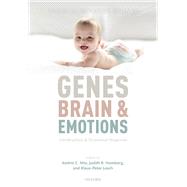The study of emotions has rapidly expanded in recent decades, incorporating interdisciplinary research on the genetic underpinnings and neural mechanisms of emotion. This has involved a wide range of methods from as varied fields as behavioral genetics, molecular biology, and cognitive neuroscience, and has allowed researchers to start addressing complex multi-level questions such as: what is the role of genes in individual differences in emotions and emotional vulnerability to psychopathology, and what are the neural mechanisms through which genes and experience shape these emotion?
Genes, Brain, and Emotions: Interdisciplinary and translational perspectives offers a comprehensive account of this interdisciplinary field of research, bridging psychology, genetics, and neuroscience, with rich sections dedicated to methods, cognitive and biological mechanisms, and psychopathology. Written by leading researchers who have each inspired new research directions and innovated methods and concepts, this book will be of interest to anyone working or studying in the field of affective science, whether they be behavioural geneticists, psychologists and psychiatrists, or cognitive neuroscientists.








